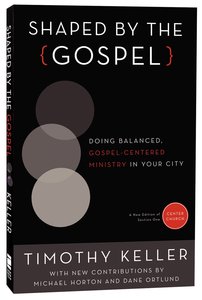Shaped by the Gospel by Tim Keller is an adapted version of Keller’s book Center Church that has been broken down to include contributions and reflections from other Christian authors…this version includes input from Michael Horton and Dane Ortlund, two Christian leaders that I have a great amount of respect for. The purpose of this book is to help the reader understand what balanced ministry looks like. There are some ministries that are committed to only teaching doctrine. There are some ministries that are only committed to service with no discussion of doctrine. Keller’s goal with sharing his thoughts are to build a bridge between thinking and doing that will ultimately help people understand both the breadth and the depth of the gospel message. This book is a quick read, but full of great theological discussion points to consider.
I highlighted several things while reading and have posted those notes below…
- “A theological vision allows people to see their culture in a way different than they had ever been able to see it before…Those who are empowered by the theological vision do not simply stand against the mainstream impulses of the culture but that the initiative both to understand and speak to that culture from the framework of the Scriptures…The modern theological vision must seek to bring the entire counsel of God into the world of its time in order that its time might be transformed.” Richard Lints, Gordon-Conwell Seminary professor
- A theological vision creates a bridge between doctrine and expression. It is central to how all ministry happens.
- The gospel axis: At one end of the axis is legalism, the teaching that asserts or the spirit that implies we can save ourselves by how we live. At the other end is antinomianism or, in popular parlance, relativism—the view that it doesn’t matter how we live; that God, if he exists, loves everyone the same.
- All human problems are ultimately symptoms, and our separation from God is the cause.
- The gospel is not about something we do but about what has been done for us, and yet the gospel results in a whole new way of life. This grace and the good deeds that result must be both distinguished and connected.
- “The gospel does bring us solutions to these problems, but it does so by first solving…the deepest of all human problems, the problem of man’s relations with his Maker; and unless we make it plain that the solution of these former problems depends on the settling of this latter one, we are misrepresenting the message and becoming false witnesses of God.” J.I. Packer, Knowing God
- We must not just preach the Bible in general; we must preach the gospel. Yet unless those listening to the message understand the Bible in general, they won’t grasp the gospel. The more we understand the whole corpus of biblical doctrine, the more we will understand the gospel itself—and the more we understand the gospel, the more we will come to see that this is, in the end, what the Bible is really about. Biblical knowledge is necessary for the gospel and distinct from the gospel, yet it so often stands in when the gospel is not actually present the people have come to mistake its identity.
- Saving faith isn’t a level of psychological certainty; it is an act of the will in which we rest in Jesus. We give ourselves wholly to him because he gave himself wholly for us (Mark 8:34; Revelation 3:20).
- The gospel is so rich that it can be communicated in a form that fits every situation. It is a singular message, but it is not a simple message.
- The “already but not yet” of the kingdom keeps us from utopian, triumphalist visions of cultural takeover on the one hand, and from pessimism or withdrawal from society on the other.
- The gospel is so accessible that anyone can wade in it and so profound that one can swim in its depths without ever touching the bottom.
- As ministers, the gospel should affect how we think about our ministry and how we serve others. We should see those whom we serve not as consumers or as burdens, but as images of God and fellow brothers and sisters with us in a redeemed family. We may need to rethink our church’s ministry from the ground up, do a little spring cleaning, and trim the distractions away so we can more faithfully distribute Christ and his gifts for “you and your children and for all who are far off—for all whom the Lord our God will call” (Acts 2:39).
- The leaders of the church must always be bringing the gospel to bear on people’s minds and hearts so that they see it as not just a set of beliefs but as a power that changes us profoundly and continually. Without this kind of application of the gospel, mere teaching, preaching, baptizing, and catechizing are not sufficient.
- A deep grasp of the gospel is the antidote to license and antinomianism.
- The gospel of God’s grace doesn’t try to bend a heart into a new pattern; it melts it and re-forms it into a new shape.
- It is possible to get an “A” on a doctrinal test and describe accurately the doctrines of our salvation, yet be blind to their true implications and power.
- When the gospel comes home—when believers no longer have to maintain their image as competent and righteous—it naturally breaks down barriers that impeded relationships and leads to more authentic experiences of community with others. Pretense and evasion become unnecessary. The gospel also creates a humility that makes believers empathic and patient with others. All of this enables relationships within the church to thicken and deepen. During times of renewal, the distinct countercultural nature of the church becomes attractive to outsiders.

